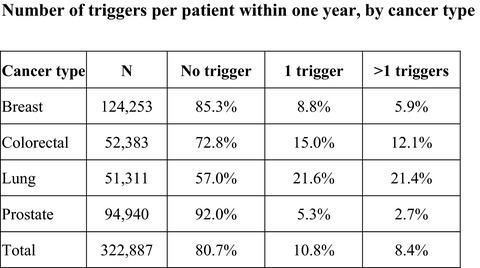当前位置:
X-MOL 学术
›
Cancer Med.
›
论文详情
Our official English website, www.x-mol.net, welcomes your feedback! (Note: you will need to create a separate account there.)
Developing a cancer-specific trigger tool to identify treatment-related adverse events using administrative data.
Cancer Medicine ( IF 4 ) Pub Date : 2020-01-03 , DOI: 10.1002/cam4.2812 Saul N Weingart 1, 2, 3 , Jason Nelson 4 , Benjamin Koethe 4 , Omar Yaghi 1 , Stephan Dunning 3 , Albert Feldman 3 , David M Kent 1, 2, 4 , Allison Lipitz-Snyderman 5
Cancer Medicine ( IF 4 ) Pub Date : 2020-01-03 , DOI: 10.1002/cam4.2812 Saul N Weingart 1, 2, 3 , Jason Nelson 4 , Benjamin Koethe 4 , Omar Yaghi 1 , Stephan Dunning 3 , Albert Feldman 3 , David M Kent 1, 2, 4 , Allison Lipitz-Snyderman 5
Affiliation

|
BACKGROUND
As there are few validated tools to identify treatment-related adverse events across cancer care settings, we sought to develop oncology-specific "triggers" to flag potential adverse events among cancer patients using claims data.
METHODS
322 887 adult patients undergoing an initial course of cancer-directed therapy for breast, colorectal, lung, or prostate cancer from 2008 to 2014 were drawn from a large commercial claims database. We defined 16 oncology-specific triggers using diagnosis and procedure codes. To distinguish treatment-related complications from comorbidities, we required a logical and temporal relationship between a treatment and the associated trigger. We tabulated the prevalence of triggers by cancer type and metastatic status during 1-year of follow-up, and examined cancer trigger risk factors.
RESULTS
Cancer-specific trigger events affected 19% of patients over the initial treatment year. The trigger burden varied by disease and metastatic status, from 6% of patients with nonmetastatic prostate cancer to 41% and 50% of those with metastatic colorectal and lung cancers, respectively. The most prevalent triggers were abnormal serum bicarbonate, blood transfusion, non-contrast chest CT scan following radiation therapy, and hypoxemia. Among patients with metastatic disease, 10% had one trigger event and 29% had two or more. Triggers were more common among older patients, women, non-whites, patients with low family incomes, and those without a college education.
CONCLUSIONS
Oncology-specific triggers offer a promising method for identifying potential patient safety events among patients across cancer care settings.
中文翻译:

开发特定于癌症的触发工具,以使用管理数据来识别与治疗相关的不良事件。
背景技术由于很少有经过验证的工具可以识别整个癌症护理环境中与治疗相关的不良事件,因此我们试图开发肿瘤学特定的“触发器”,以使用索赔数据来标记癌症患者之间的潜在不良事件。方法从大型商业索赔数据库中抽取322 887名成年患者,这些患者在2008年至2014年期间接受了针对乳腺癌,结肠直肠癌,肺癌或前列腺癌的癌症直接治疗。我们使用诊断和程序代码定义了16种肿瘤学特定的触发器。为了从合并症中区分出与治疗相关的并发症,我们需要在治疗和相关触发因素之间建立逻辑和时间上的联系。我们按照癌症类型和转移状态在1年的随访中列出了触发因素的患病率,并检查了癌症触发因素。结果在最初的治疗年中,癌症特异性触发事件影响了19%的患者。触发负担因疾病和转移状态而异,分别从非转移性前列腺癌患者的6%到转移性结直肠癌和肺癌患者的41%和50%。最普遍的触发因素是血清碳酸氢盐异常,输血,放疗后无造影剂胸部CT扫描和低氧血症。在转移性疾病患者中,10%发生一次触发事件,29%发生两次以上事件。触发因素在老年患者,女性,非白人,家庭收入较低的患者以及未受过大学教育的患者中更为常见。结论肿瘤特异性触发因素为在跨癌症护理机构中识别潜在患者安全事件提供了一种有前途的方法。
更新日期:2020-01-04
中文翻译:

开发特定于癌症的触发工具,以使用管理数据来识别与治疗相关的不良事件。
背景技术由于很少有经过验证的工具可以识别整个癌症护理环境中与治疗相关的不良事件,因此我们试图开发肿瘤学特定的“触发器”,以使用索赔数据来标记癌症患者之间的潜在不良事件。方法从大型商业索赔数据库中抽取322 887名成年患者,这些患者在2008年至2014年期间接受了针对乳腺癌,结肠直肠癌,肺癌或前列腺癌的癌症直接治疗。我们使用诊断和程序代码定义了16种肿瘤学特定的触发器。为了从合并症中区分出与治疗相关的并发症,我们需要在治疗和相关触发因素之间建立逻辑和时间上的联系。我们按照癌症类型和转移状态在1年的随访中列出了触发因素的患病率,并检查了癌症触发因素。结果在最初的治疗年中,癌症特异性触发事件影响了19%的患者。触发负担因疾病和转移状态而异,分别从非转移性前列腺癌患者的6%到转移性结直肠癌和肺癌患者的41%和50%。最普遍的触发因素是血清碳酸氢盐异常,输血,放疗后无造影剂胸部CT扫描和低氧血症。在转移性疾病患者中,10%发生一次触发事件,29%发生两次以上事件。触发因素在老年患者,女性,非白人,家庭收入较低的患者以及未受过大学教育的患者中更为常见。结论肿瘤特异性触发因素为在跨癌症护理机构中识别潜在患者安全事件提供了一种有前途的方法。



























 京公网安备 11010802027423号
京公网安备 11010802027423号